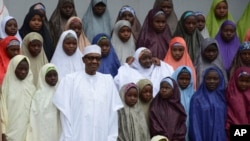Nigerian President Muhammadu Buhari claimed in late November that weapons from the Ukraine-Russia war are showing up in the Lake Chad Basin region, where they’re helping terrorist groups and making chronic security problems worse.
Addressing leaders at the 16th Summit of Heads of State and Government of the Lake Chad Basin Commission (LCBC)), Buhari said:
“Weapons being used for the war in Ukraine and Russia are equally beginning to filter to the region. This illegal movement of arms into the region has heightened the proliferation of small arms and light weapons which continues to threaten our collective peace and security in the region.”
The statement was signed and released by Buhari’s special advisor on media and publicity, Femi Adesina, on November 29.
Buhari’s claim, however, is unsubstantiated. There have been no public reports of arms from the Eastern European conflict coming into the Lake Chad Basin region. Nor did Buhari provide any evidence to back up the assertion.
Buhari won Nigeria’s 2015 presidential election on a counter-terrorism platform. But despite years of conflict and humanitarian losses, Boko Haram, one of the longest-operating Islamist military groups in Africa, and ISIS-West Africa (ISIS-WA), continue to attack security forces across the region.
Boko Haram has carried out multiple attacks “on religious and political groups, local police, and the military, as well as indiscriminately attacking civilians in busy markets and villages,” the Council on Foreign Relations reports.
Long-running insurgencies by Boko Haram and other groups were responsible for more than 350,000 deaths through the end of 2020, a United Nations report found. Most of those deaths – 314,000 – were from indirect causes, such as lack of food or other basic needs, with the remainder involving combatants.
According to the U.S. Department of State, Boko Haram and ISIS-WA have used “small arms, captured military equipment, detonated IEDs” to “carry out hundreds of attacks in Nigeria.” Cameroon, Niger, Chad and Nigeria created a Multinational Joint Task Force (MNJTF) to combat these groups and provide humanitarian aid in the Lake Chad region and elsewhere.
In his remarks to the commission, Buhari did not specify who he believes is diverting the weapons and how. But one authoritative report that examined the matter, published in September of 2021, said arms have coming not from outside the region – but from the spoils of successful militant attacks.
According to the International Peace Information Institute, an independent research group based in Belgium that tracks the arms trade, part of the problem is failed leadership of the multinational task force itself.
“The quantity of seized small arms and light weapons is so great that it has sustained the insurgency in the Lake Chad Basin region for over a decade,” the institute said. “In fact, the study almost certainly significantly underestimates the true scale and scope of the challenge.”
For one section of the report, the authors cited data on “more than 500 reported incidents of attacks on security sector personnel in the Lake Chad Basin region since January 2015 in which a Boko Haram faction is the likely perpetrator.”
Those attacks resulted in nearly 2,400 dead security troops, with almost 2,000 of the total from Nigeria. The report said lack of readiness, corruption and low morale all contributed to the loss of weapons to the attackers:
“A gun truck, fitted with a machine gun will frequently transport several tins of linked cartridges totaling hundreds of rounds of ammunition. A soldier may carry at least two or three magazines of 20 or 30 bullets each on his or her person. When a base is overrun, crew-served weaponry such as machine guns, mortars and towed as well as self-propelled artillery will frequently be left behind, as will thin-skinned and armoured vehicles…
“More than 100 of the recorded attacks can be described as significant in terms of losses of materiel. 'Significant' is defined as an incident in which one of the following three criterion is met: (a) 10 or more weapons are seized; (b) 1,000 or more rounds of ammunition are seized; or (c) 1 or more gun trucks — or 'technicals' as these vehicles are frequently called — or armoured vehicles are seized.”
In October, the United Nations office for Disarmament Affairs published a report on arms dynamics in the Lake Chad region. In regard to sources:
"Main sources of illicit materiel are diversions from regional national stockpiles (mainly through raids and theft, and corruption to a lesser extent), materiel ‘recycled’ from previous conflicts in the region, as well as craft production...
"Tracing of recovered materiel by specialist organizations indicates that diversions from the respective national stockpiles of [Lake Chad Basin] security and defense forces, as well as proliferation of pre-2011 Libyan stockpiles and leftovers from other conflicts in Africa are the main sources of weapons and ammunition held by Boko Haram. Materiel is acquired locally, either through battlefield capture or purchased on the illicit market."
The Nigerian president, a retired general, has been faulted for failing to make good on promises to resolve the security issues and wipe out Boko Haram. As recently as September, he described the group as “fraudulent people” and claimed they’d been defeated.
But Boko Haram remains a deadly threat. Most recently, on November 22, attackers killed an estimated 30 Chadian troops “and made off with their equipment, including heavy weapons,” Al Jazeera and other outlets reported.
The United States has provided Nigeria with helicopters, aircraft and other military equipment, some for use in fighting Boko Haram and other insurgencies.





